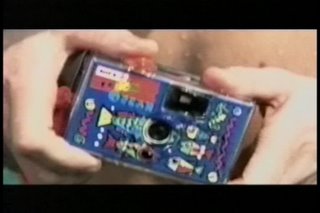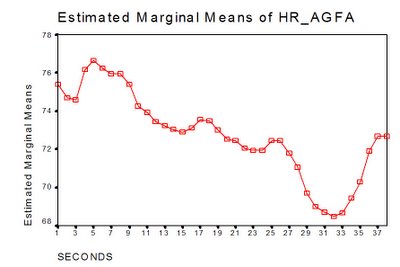Your Heart Likes Funny Commercials
Annie Lang wrote a chapter in her book titled "What can the heart tell us about thinking?" It can tell us a lot. In brief, in a properly controlled environment, the rate at which the heart beats can tell us something about attention paid to a media message.
One of my ongoing projects involves looking at cardiac response to humorous ads. In most of our research, we use several examples from a particular type of message. So, we might have participants watch 5 humorous ads and 5 boring ads. We typically look for messages of the same length -- say 30 seconds. So to compare these conditions, we average responses across the 5 messages in each condition.
This gives us more ability to generalize to that condition, but it loses the detailed responding to the features of an individual message. In this exploratory project, I am looking at responses to individual messages. In one such message, a stereotypical "nerd" is playing in the ocean in water about halfway up his torso. He runs across three attractive young women in bikinis. They decide to tease the nerd by taking off their bikini bottoms under water. Then you hear a click that is clearly a camera shutter as the girls wave the bikini bottoms in the air. The girls become embarrassed, and the nerd pulls a waterproof camera out of the water. The announcer says, "For things you'll only see once in a lifetime. The waterproof disposable camera from AGFA."
The cool thing -- to me -- is that your heart perfectly registers these humorous events. Here is an approximation of a storyboard for key events:
About 0:14 into commercial

About 0:23 into commercial

About 0:25 into commercial

Here is the cardiac response curve plotted across seconds:

This is a nice demonstration of the correspondence between cognitive perception of television and cardiac responding. You can clearly see that these 49 participants registered the humorous events, and there is a sustained deceleration after the camera is revealed, which is the punchline of the humorous ad. This should be associated with maximum attention, and it is in this period of deceleration that the slogan and brand name are delivered. This looks like a recipe for advertising success.
One of my ongoing projects involves looking at cardiac response to humorous ads. In most of our research, we use several examples from a particular type of message. So, we might have participants watch 5 humorous ads and 5 boring ads. We typically look for messages of the same length -- say 30 seconds. So to compare these conditions, we average responses across the 5 messages in each condition.
This gives us more ability to generalize to that condition, but it loses the detailed responding to the features of an individual message. In this exploratory project, I am looking at responses to individual messages. In one such message, a stereotypical "nerd" is playing in the ocean in water about halfway up his torso. He runs across three attractive young women in bikinis. They decide to tease the nerd by taking off their bikini bottoms under water. Then you hear a click that is clearly a camera shutter as the girls wave the bikini bottoms in the air. The girls become embarrassed, and the nerd pulls a waterproof camera out of the water. The announcer says, "For things you'll only see once in a lifetime. The waterproof disposable camera from AGFA."
The cool thing -- to me -- is that your heart perfectly registers these humorous events. Here is an approximation of a storyboard for key events:



Here is the cardiac response curve plotted across seconds:

This is a nice demonstration of the correspondence between cognitive perception of television and cardiac responding. You can clearly see that these 49 participants registered the humorous events, and there is a sustained deceleration after the camera is revealed, which is the punchline of the humorous ad. This should be associated with maximum attention, and it is in this period of deceleration that the slogan and brand name are delivered. This looks like a recipe for advertising success.




 FOLLOW SAM ON TWITTER
FOLLOW SAM ON TWITTER
 SUBSCRIBE TO THIS FEED
SUBSCRIBE TO THIS FEED

1 Comments:
These really are some great results.
Post a Comment
<< Home